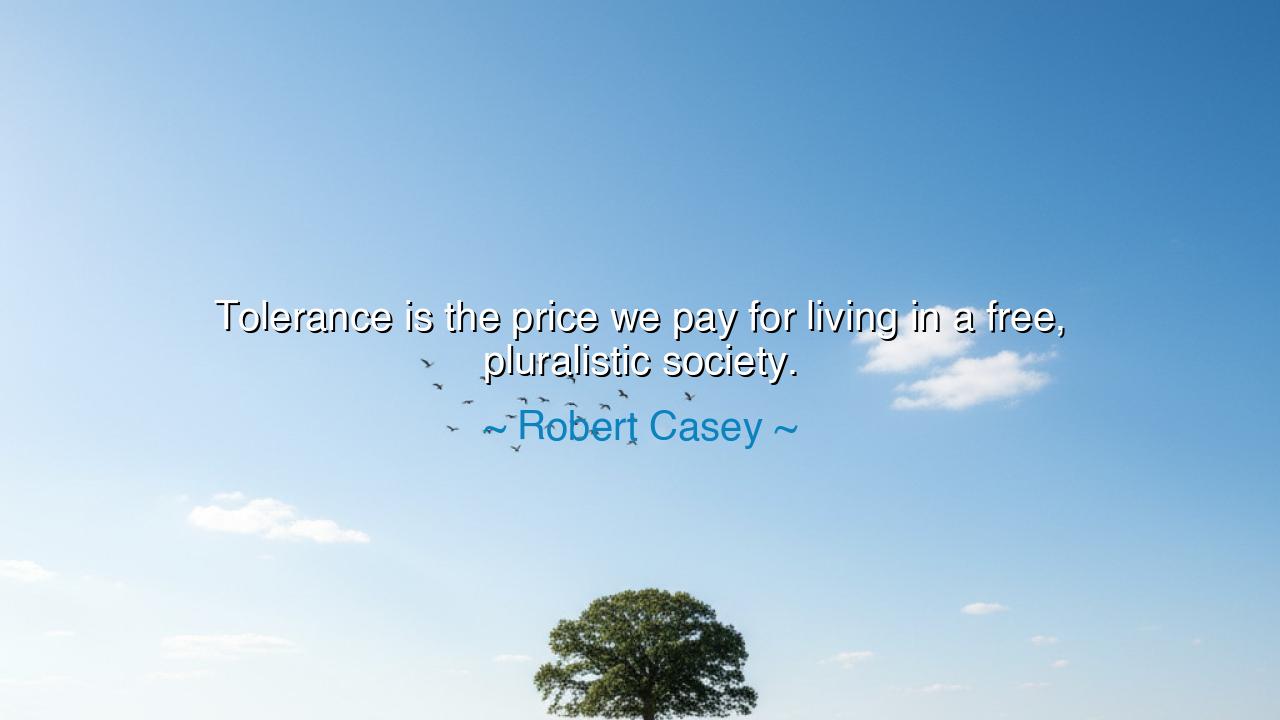
Tolerance is the price we pay for living in a free, pluralistic






Listen, O children, to the profound wisdom of Robert Casey, who once declared, "Tolerance is the price we pay for living in a free, pluralistic society." These words ring out like a call to those who would seek to live freely in a world that embraces diversity, complexity, and the multitude of voices that speak across the generations. To live in a free society, one that does not demand conformity but celebrates the richness of human experience, is to accept that tolerance is not simply a virtue, but the foundation of the world we must build together.
What, O children, does it mean to say that tolerance is the price we pay? It is to acknowledge that in a world where freedom reigns, where every individual has the right to choose their path, to speak their truth, and to hold their beliefs, there will be differences. These differences are the very lifeblood of a pluralistic society, a society made vibrant by the diversity of its people, its cultures, and its ideas. But with such freedom comes a cost—tolerance. We must be willing to accept, respect, and even celebrate views and ways of life that differ from our own, understanding that tolerance is not mere indifference, but the active choice to live in harmony with others, despite our differences.
Consider, O children, the wisdom of the ancient Greeks, who understood the value of a society that embraced diversity in thought. In the great city of Athens, where philosophers like Socrates, Plato, and Aristotle questioned the very nature of truth, justice, and existence, there was a profound recognition that the freedom of speech and thought was the cornerstone of a vibrant society. Yet, this freedom required tolerance—the willingness to listen to voices that might disagree with you, to engage in the exchange of ideas, and to learn from those who see the world differently. Without tolerance, their great intellectual tradition would have been stifled, and the flourishing of thought would have been impossible. In their openness to differing views, they forged a society that became the foundation of Western philosophy.
In our own time, O children, we can look to the example of Nelson Mandela, whose life was a testament to the power of tolerance in the face of unimaginable adversity. After spending 27 years in prison under the brutal regime of apartheid in South Africa, Mandela emerged not with vengeance in his heart, but with a vision of unity and reconciliation. He understood that to build a truly free society, he would have to embrace tolerance, not just for himself, but for the many who had once been his oppressors. Mandela’s vision of a pluralistic society, where people of different races and backgrounds could live together in peace, required that every individual practice the difficult art of tolerance. It was not an easy path, but it was the only way forward. His life teaches us that freedom and tolerance go hand in hand.
But O children, the lesson that Casey imparts is not an easy one, for in every society there are those who resist the challenge of tolerance. We are surrounded by voices that seek to divide, that insist upon the superiority of one belief, one identity, or one way of life over another. In our own time, we see the rise of extremism, whether it takes the form of political or religious intolerance, as groups seek to impose their vision of the world upon others. Yet, to build a just and free society, we must reject these forces of division and embrace the difficult path of understanding. Tolerance is not the same as agreement; it is the recognition that others have a right to their own views, their own lives, and their own beliefs, just as we do.
So, O children, the lesson is clear: if we wish to live in a society that is free, one that honors the dignity and rights of every individual, we must understand that tolerance is the price we pay for that freedom. We must be willing to accept that others will have different ideas, different ways of life, and different beliefs—and that this diversity is what makes us stronger, richer, and more capable of facing the challenges of the future. But to practice tolerance is not passive; it is active, it is a choice, and it requires strength and courage to listen, to engage, and to seek understanding. It means acknowledging that we do not have all the answers, but that by embracing others in their differences, we can find a way to move forward together.
Therefore, O children, I charge you to live by the wisdom of tolerance. Seek not to impose your will upon others, but to understand their stories, their struggles, and their hopes. Embrace the diversity of thought, of culture, of experience, for in that diversity lies the true strength of society. Stand firm in the face of those who would seek to divide, and choose instead the path of unity through tolerance. Celebrate the differences among you, for they are the foundation upon which a truly free and just society can be built. In this way, you will honor the legacy of those who fought for freedom and equality, and you will ensure that the future remains a place where every voice, no matter how different, has a place to be heard.






AAdministratorAdministrator
Welcome, honored guests. Please leave a comment, we will respond soon